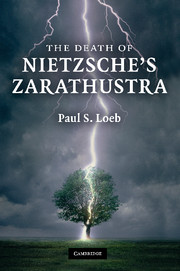3 - The dwarf and the gateway
Published online by Cambridge University Press: 04 August 2010
Summary
Commenting retrospectively on his first book, The Birth of Tragedy, Nietzsche remarks: “What a shame that I did not dare say as a poet what I had to say then: I might have been able to do it!” (BT P:3). Since an essential part of what he had to say then concerned his dismay at Socrates' triumph over the Dionysian, Nietzsche thus hints that his most important later work, Thus Spoke Zarathustra, is a renewed, and this time appropriately poetic attempt to overcome Socrates' resulting influence as “the one turning point and vortex of so-called world-history” (BT 15). And since Nietzsche also tells us that eternal recurrence is the fundamental thought of that later work, we are led to conclude further that he now intends this doctrine, as taught by “that Dionysian monster who bears the name Zarathustra” (BT P:7), to be the site of his decisive and world-historic agon with Plato's Socrates.
As we have seen, the concluding trilogy of Gay Science aphorisms anticipates the victory of Nietzsche's dying Zarathustra over Plato's dying Socrates in the psychological contest as to who is better disposed to life. Whereas the Phaedo's Socrates would have been psychologically crushed by the deathbed revelation that he would have to eternally relive his life, Nietzsche invents an antipode that will crave nothing more fervently than this last confirmation and seal.
- Type
- Chapter
- Information
- The Death of Nietzsche's Zarathustra , pp. 45 - 84Publisher: Cambridge University PressPrint publication year: 2010



